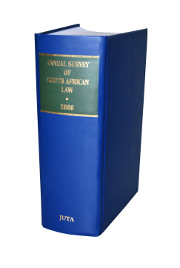Intellectual Property Law

Intellectual Property Law
Authors Roshana Kelbrick, Coenraad Visser
ISBN: 978 1 48513 300 1
Affiliations: Professor of Intellectual Property Law in the Department of Mercantile Law, University of South Africa, Pretoria; Professor of Intellectual Property Law in the Department of Mercantile Law, University of South Africa, Pretoria
Source: Annual Survey of South African Law, 2014, p. 626 – 644
Abstract
None